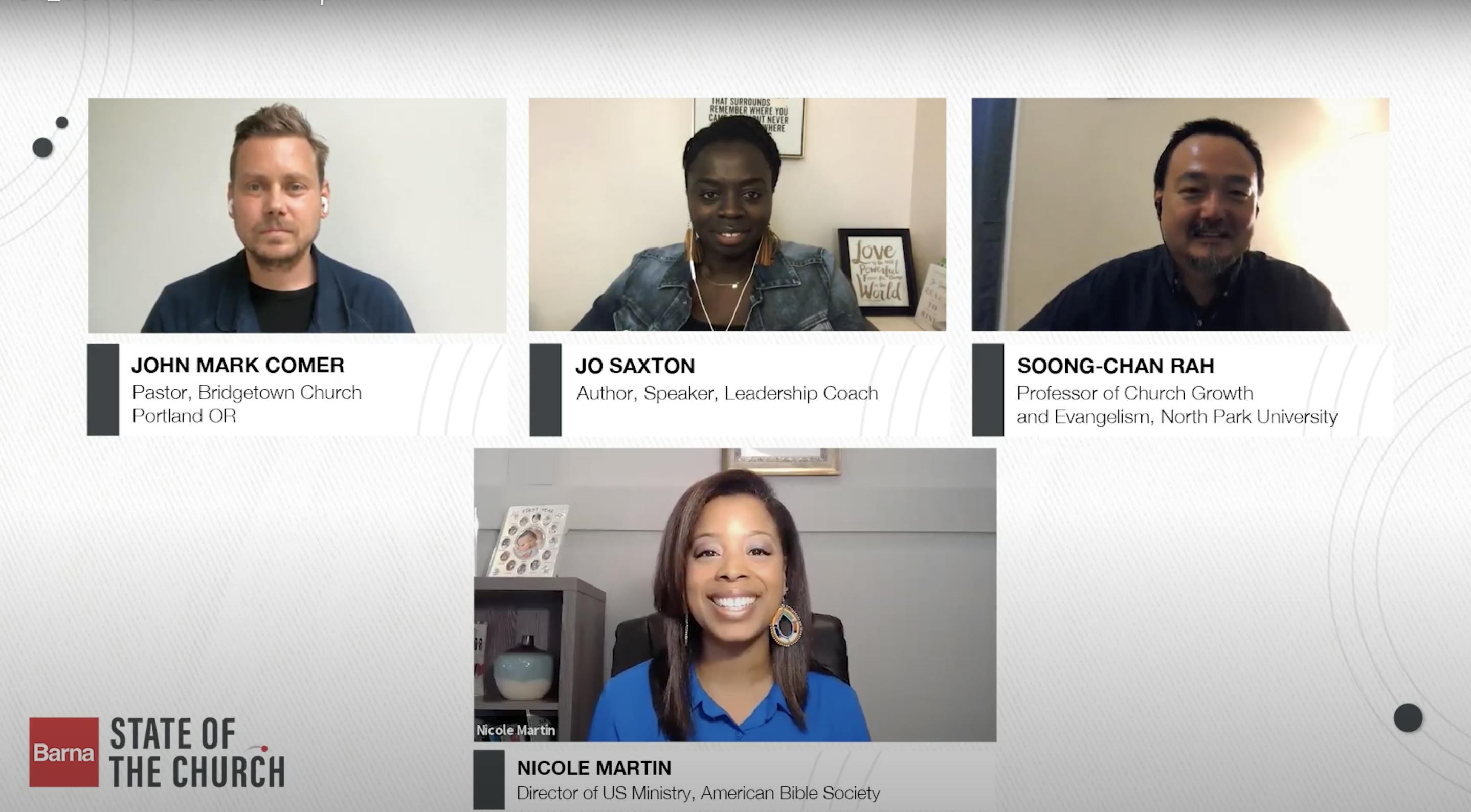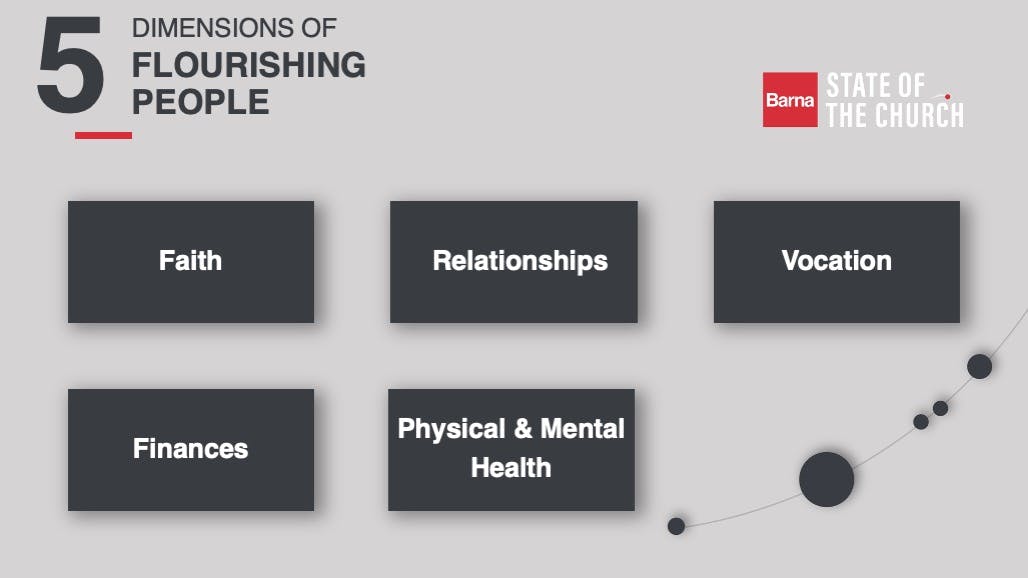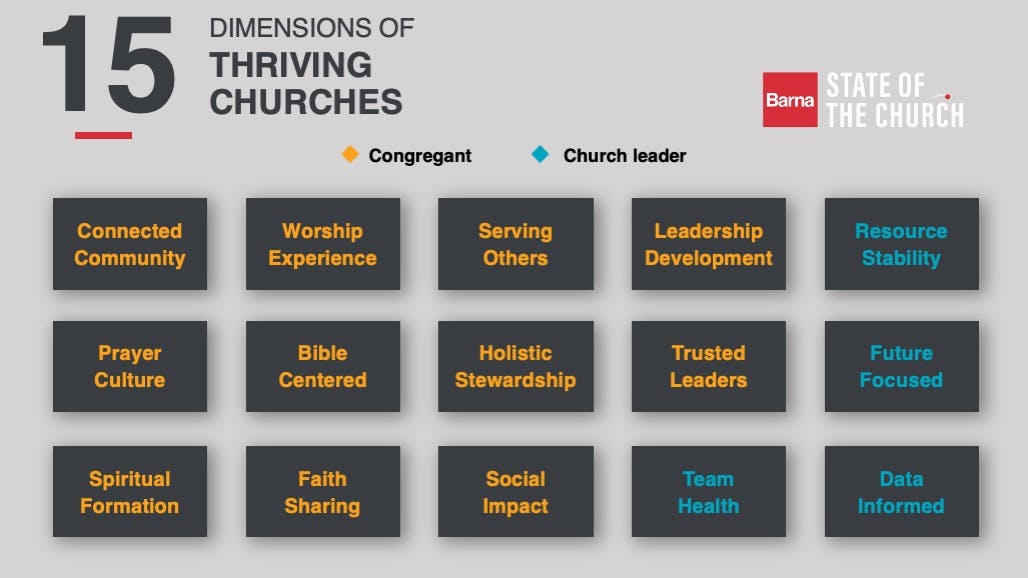On May 20, Barna and project partner Gloo hosted a live webcast, Caring for Souls in a New Reality, to reveal recent findings related to how the COVID-19 crisis has affected the U.S. Church. Barna president David Kinnaman was joined by webcast cohosts Carey Nieuwhof, founding pastor of Connexus Church, author and podcaster, and Nicole Martin, Director of U.S. Ministry at the American Bible Society.
Together, alongside expert guests and fellow thought leaders (John Mark Comer, Jo Saxton, Soong-Chan Rah, Danielle Strickland, Bobby Gruenewald, Skye Jethani, Nona Jones, Lysa TerKeurst, Dr. Henry Cloud, Sandra Maria Van Opstal, Rev. Dr. Eric Mason, Thom Rainer and Tim Keller), Kinnaman, Nieuwhof and Martin presented findings related to human flourishing, organizational thriving and effective leadership, focusing on three things church leaders can do as they care for the souls entrusted to their leadership: reset, refocus and restore.
The webcast—primarily produced and hosted remotely during this period of social distancing—was mindful not only of the ministry concerns of the COVID-19 crisis but the spiritual ones of attendees as well; panels and presentations were punctuated by moments of worship and a series of “prayer postures” led by activist Danielle Strickland.
Below, explore highlights from the data and the webcast, which will be available as a free replay on Barna Access, a new digital subscription service.
Reset: What culture and faith trends have emerged as a result of the pandemic?
The COVID-19 crisis has drastically impacted the way the world works, let alone churches and the communities and people they serve. As the United States steps into its third month of the pandemic, pastors are grappling with a handful of knowns and myriad unknowns when it comes to leading their congregants through the current moment, facing challenges in logistics, well-being and more. The first part of Caring for Souls in a New Reality centered around taking stock of the impact and understanding this cultural reset.
We’re living in a new reality, increasing the frequency of simple safety measures throughout our day as well as distancing ourselves from others—strangers, friends or family—a change that has a marked impact on people’s well-being. In fact, Kinnaman presented the webcast audience with recent Barna data showing that, while half of U.S. adults (49%) would say they have not at all felt lonely during the last seven days, one in five (20%) says they felt this at least once during the past week, another 20 percent say this is true for at least some of each day and one in 10 (11%) says they felt this all of the time.
While COVID has definitely accelerated certain disruptions—mental health, relational well-being, vocational and financial uncertainty—it has also changed the way Christians practice their faith. Recently, when commenting on how the pandemic has affected their personal faith journey, half of Christians (48%) report praying more than usual and 17 percent say they are reading the Bible more than usual. Non-Christians have also sought out spiritual guidance during the crisis, some by tuning in to an online message (16% other faith, 2% no faith), meeting with a small group or Bible study online (16% other faith, 1% no faith), joining a prayer service or prayer meetings online (14% other faith, 1% no faith) and searching for answers to spiritual questions online (13% other faith, 2% no faith). Twelve percent of those with another faith say they have started praying, something they admit to not having done regularly prior to the pandemic.
Webcast co-host Nicole Martin sat down with the following contributors to discuss these recent findings related to the ongoing change in culture and faith trends.
“I think part of the benefit—if I could put it that way—of a crisis is that it reveals the flaws and the weaknesses that we’ve [as the Church] tolerated over the years. When a crisis like this hits, we’re forced to face some of these challenges that we’ve allowed to fester for many years.” —Soong-Chan Rah, Professor of Church Growth and Evangelism at North Park University
“I face a daily urge to overact in an attempt to save our church from perceived doom. For me, not meeting on Sundays or not rushing out and filling the void is really the greatest act of trust in God. … When I can really trust [him], I can accept the reality of winter and not fight it but make peace with it and even find a deep joy and contentment within it.” —John Mark Comer, Pastor at Bridgetown Church in Portland, OR
“I think our opportunity in this moment, when we’re thinking spiritual formation and digital discipleship, is what are you going to do to give people access to your life at this moment? … I think that’s the thing that we miss about being together. We might be so caught up on making sure everyone gets the best and the right content—I’m not saying that’s a bad thing—but that is only one of the incredible tenets of discipleship.” —Jo Saxton, Author, Speaker and Leadership Coach
This segment also included an interview with Randy Frazee, Lead Teaching Pastor at Westside Family Church in Kansas City, Kansas.
Barna Access Plus
Strengthen your message, train your team and grow your church with cultural insights and practical resources, all in one place.
Refocus: How can we leverage the digital landscape to make resilient disciples?
As part of our State of the Church 2020 project, Barna researched new metrics that church leaders can leverage to measure how well their people are flourishing and their churches are thriving. The five dimensions of human flourishing include: faith, relationships, vocation, finances, and physical & mental health.
Barna also identified and categorized 15 dimensions of thriving churches, which include connected community, prayer culture, spiritual formation, worship experience and faith sharing, among others.
Barna’s new ChurchPulse assessment, which can be found on Barna Access—a new digital subscription platform—is a companion to this research, allowing pastors to gauge the health of their congregants and ministries.
In a panel about innovative and change in the digital age, webcast contributors Bobby Gruenewald, Skye Jethani and Nona Jones took time to encourage pastors to continue finding meaningful ways to check in and connect with their people.
“I think one of the really positive things I’ve seen is the emphasis on ‘the Church is the people and not the building.’ People say those words a lot of times, but until you’re forced into this reality, I don’t think people fully comprehend that. I see pastors really embracing this notion that this is not our building anymore, it’s really about the flock, the community and the people that are there.” —Bobby Gruenewald, Pastor and Innovation Leader at Life.Church
“Really good digital innovation is using these tools in a way that assists rather than replaces incarnate ministry. I think digital technology is uniquely positioned to help us [for example] is with data and getting more information about our people, our churches, what they’re actually doing and what they need.” —Skye Jethani, Co-Host on the Holy Post Podcast
“I want [pastors] to be thinking about ‘How do people know that I see them?’, responding to [people’s] questions, commenting or tagging them in conversations, welcoming them by name when going live. Doing those kinds of things [shows] that even though we’re on a platform, we are still connecting in a meaningful way.” —Nona Jones, Head of Faith-Based Partnerships at FaceBook
This segment also included interviews with Lysa TerKeurst and Dr. Henry Cloud, as well as a panel discussion on how churches can thrive in a crisis with Sandra Maria Van Opstal, Rev. Dr. Eric Mason and Thom Rainer.
Restore: How is God forming us to be more humble, resilient and dependent on him?
The webcast came to a close with Barna president David Kinnaman discussing what it means to pastor in this new reality. Not only are pastors stewarding the hearts of their people and attempting to meet felt needs during this disruption, they are also wrestling with the significant toll the crisis has taken on their personal well-being—relational, emotional and mental—and their sense of vocation and calling.
Recent data from Barna’s weekly pastor panel check ins show that even though over half of pastors (55%) admit to having felt primarily happy within the last week, another half (51%) admits they were tired and two in five say they primarily felt sad (41%) or panicked (39%). Over half of church leaders (52%) admit to having felt lonely within the last month and a larger percent (68%) say they have felt overwhelmed.
“As we think about restoring your vision for leadership,” says Kinnaman to church leaders viewing the digital event, “if the data tells us anything about where pastors are at today, it’s that you’re feeling worn out, asking how long this is going to last and wondering when we can get back to a sense of normalcy.”
“I wanted to make sure we ended on a spiritual note to really encourage you that Jesus himself is leading his church. That among the things that are known and unknown, we can have great confidence that Jesus isn’t going to let his Church get lost.”
In the final interview for the webcast, co-host Carey Nieuwhof sat down with Tim Keller to discuss pastoring in a new reality and the five dimensions of human flourishing, and how they apply to both pastors and their people. In closing, Keller offered words of encouragement.
“All five of those [dimensions] are fruit of the Spirit. My take on the fruit of the Spirit is: love, joy, peace, patience, kindness, integrity, humility, faithfulness and self-control. Proverbs also talks about these five areas. [Pastors] really can’t ignore any of these areas and need to make sure that they’re honoring Christ in each of these areas.” —Tim Keller, Founding Pastor of Redeemer Presbyterian Church in Manhattan
What’s Next?
If you missed the webcast, want to watch certain clips or hope to share it with someone else, visit Barna Access—our new digital subscription service—to view the replay for a limited time. Barna Access is also home to our ChurchPulse tools, which can be viewed and utilized with a free membership.
About the Research
The statistics and data-based analyses in this study are derived from a national public opinion survey conducted by Barna among 1,000 U.S. adults. Responses were collected online between April 28-May 5, 2020, using a nationally representative panel. The rate of error for this data is +/- 2.2% at the 95% confidence level.
Additional COVID-19 Pastor Data: Barna Group conducted these online surveys among 1,759 Protestant Senior Pastors from March 20–May 18, 2020. Participants are all members of Barna Group’s Church Panel. Minimal weighting has been used to ensure the sample is representative based on denomination, region and church size.
Data Collection Dates
Week 1, n=222, March 20-23, 2020
Week 2, n=212, March 24-30, 2020
Week 3, n=195, March 31-April 6, 2020
Week 4, n=246, April 7-13, 2020
Week 5, n=204, April 14-20, 2020
Week 6, n=164, April 21-27, 2020
Week 7, n=167, April 28-May 4, 2020
Week 8, n=165, May 5-11, 2020
Week 9, n=184, May 12-18, 2020
© Barna Group, 2020.
About Barna
Since 1984, Barna Group has conducted more than two million interviews over the course of thousands of studies and has become a go-to source for insights about faith, culture, leadership, vocation and generations. Barna is a private, non-partisan, for-profit organization.
Related Posts

Five Things We’ve Learned During the COVID-19 Crisis
- Church
- Leadership

The Uncertain Digital & Physical Realities of Churches
- Church
- Technology
Lead with Insight
Strengthen your message, train your team and grow your church with cultural insights and practical resources, all in one place.
Get Barna in your inbox
Subscribe to Barna’s free newsletters for the latest data and insights to navigate today’s most complex issues.












